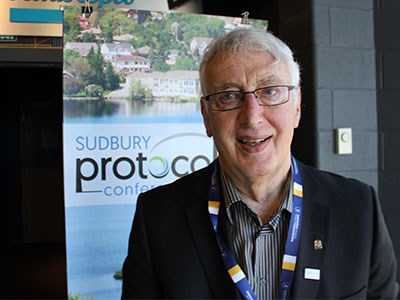The opening day of the Sudbury Protocol Conference got off to a shaky start with plenty of unanswered questions thrust upon the organizers.
The Laurentian University initiative aims to take Sudbury's regreening expertise, gained over the last 40 years from repairing the environmental damage from mining, and globally package it for use by other communities adversely impacted by industrial development.
As they launched the conference on May 10, local experts expressed uncertainty about the business side of the project and what financial benefits the protocol is proposing.
“I'm still fundamentally confused by what you're trying to package. I'm asking you to create a business plan,” said Dick DeStefano, executive director of the Sudbury Area Mining Supply and Service Association (SAMSAA), on the opening day of the three-day conference held at Dynamic Earth. “If you don't have a business plan, I can't sell it.”
“Regreening is a pretty small deal, but it isn't what made the economy,” said Laurentian economic professor David Robinson. From an academic perspective, he said it's essential the university collaborate with industry with entities like a commercialization arm similar to MIRARCO, a mining innovation corporation attached to Laurentian.
John Gunn, director of the Vale Living with Lakes Centre, agreed that reaching out to industry is essential.
“It can't be navel gazing that we have all the answers... it can't just be self-congratulatory courses,” said Gunn, who added they need to create a product that brings the research out of the lab.
“We need to monetize the system,” said DeStefano.
Supporting and engaging small to medium enterprises in the sector would be essential, said DeStefano, who agreed with Robinson that there’s not enough of an existing base of businesses involved in the regreening effort in Sudbury.
“If I get a call from Bolivia, is there anyone here who can recover a mine site?” asked DeStefano.
DeStefano and others questioned whether the initiative was ready to forward, but pledged to “help as much as I can.”
Other topics to be covered during the conference are government and legislation; research and innovation; industry, labour and occupational health; and community and First Nations.
The Sudbury Protocol was first announced in November and is currently advancing with Science North, Dynamic Earth, the Social Sciences and Humanities Research Council of Canada (SSHRC), the Northern Heritage Fund Corporation (NOHFC), and the City of Greater Sudbury as official partners.




